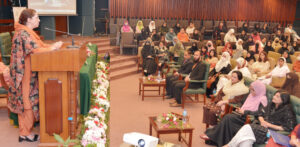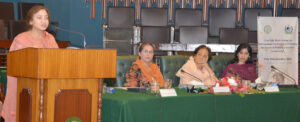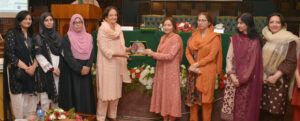 A three-day international conference titled “Less Talk More Action: Changing the Course of Women’s Academic Leadership,” organized by the LCF project team spear-headed by Dr Samina Malik, Rector of International Islamic University Islamabad (IIUI) and Dr. Asma Mansoor of the Department of English in collaboration with the Higher Education Commission Pakistan (HEC), ended here at the Allama Iqbal Auditorium, Faisal Masjid Campus of the university.
A three-day international conference titled “Less Talk More Action: Changing the Course of Women’s Academic Leadership,” organized by the LCF project team spear-headed by Dr Samina Malik, Rector of International Islamic University Islamabad (IIUI) and Dr. Asma Mansoor of the Department of English in collaboration with the Higher Education Commission Pakistan (HEC), ended here at the Allama Iqbal Auditorium, Faisal Masjid Campus of the university.
Prof. Dr. Bushra Mirza (Tamgha-i-Imtiaz and Pride of Performance) as well as Prof Dr. Haroona Jatoi who has worked with Harvard University, Graduate School of Education were the Chief Guest and Guest of Honour respectively.

 This international conference is a part of the “Shattering the Glass Ceiling: Challenges and Opportunities for Women Academic Leaders in Pakistani Universities” project, funded by Pakistan’s Higher Education Commission and won by Dr Samina Malik and Dr Asma Mansoor.
This international conference is a part of the “Shattering the Glass Ceiling: Challenges and Opportunities for Women Academic Leaders in Pakistani Universities” project, funded by Pakistan’s Higher Education Commission and won by Dr Samina Malik and Dr Asma Mansoor.
Prof. Malik, Rector, IIUI addressing the closing ceremony, flagged the significance of such events in paving the path for a safer academic space for women, acknowledging the support of her team. She recalled that the project emanated out of her academic interaction and exchange of ideas with Dr. Asma Mansoor but has now burgeoned into a much larger task that encapsulates more women acting as mutual enablers and mentors.
 On this occasion, Dr. Samina Malik lauded the team, particularly Dr. Fatima Maqsood, Dr. Fatima Alvi, Dr. Saima Yasmeen, Dr. Fouzia Ajmal, Dr. Aleena, Dr. Sufi Amin and Dr. Ishrat Siddiqa Lodhi who is from the Fatima Jinnah Women University, Rawalpindi. She specifically appreciated the Fatima Jinnah Women University Rawalpindi for its excellent support as a partner university in the project.
On this occasion, Dr. Samina Malik lauded the team, particularly Dr. Fatima Maqsood, Dr. Fatima Alvi, Dr. Saima Yasmeen, Dr. Fouzia Ajmal, Dr. Aleena, Dr. Sufi Amin and Dr. Ishrat Siddiqa Lodhi who is from the Fatima Jinnah Women University, Rawalpindi. She specifically appreciated the Fatima Jinnah Women University Rawalpindi for its excellent support as a partner university in the project.
Dr. Asma Mansoor, co-chair and co-principal investigator presented an overview of the conference. She highlighted the fact the conference was unconventional in its structure for it invited student and audience participation via Round Table Discussion and a seminar session. The round table discussion, “Uneasy Lies the Head that Wears the Academic Crown: Expectations for Women Academic Leaders,” highlighted the challenges and stereotypes limiting women in leadership roles and the necessity for women to break free from assumed vulnerabilities while the panel discussion, “Women Academic Leadership in Pakistani Academia: Mistakes and Lessons,” tackled gender issues in academia, emphasizing the need for inclusive spaces. It explored topics like the masculinization of academia and the importance of collective support for women.
Out of 42 papers, 14 were chosen for presentation, with Asma Aftab’s “Women’s Voices: At the Crossroads of Academy and Activism” winning the best research paper award. It challenged traditional boundaries and the connection between academia and activism. Additional papers, such as “Pashtunwali and Pashtun Women Academic Leadership” and “Women’s Participation in Academia: A Linguistic Analysis of Mansplaining,” examined cultural influences and linguistic challenges, while “Pathways to Leadership: A Cross-Cultural Analysis of Women Leaders” explored shared challenges across cultures. These discussions and papers underscored the need to transform academia into a more inclusive and robust space for women’s leadership.
An important result of the project and conference is the new women empowerment policy, developed over the past year. This initiative, led by Dr. Samina Malik, the first female rector of IIUI and prepared by Dr. Asma Mansoor offers a valuable contribution to the Higher Education Commission (HEC) and the Government of Pakistan. The policy directly addresses the key issues and gaps identified during the discussions and panels at the conference. It’s a call to action for women academic leaders to support and participate in the implementation of this groundbreaking policy, enhancing opportunities and support for women in academia.
Addressing the closing ceremony, Dr. Haroona Jatoi, lauded the efforts of Dr. Samina Malik on winning such a huge project and its successful implementation. She appreciated the policy and flagged the need for setting up a Gender Studies department while highlighting the great possibilities for growth in IIUI with its first ever female rector at the helm. Dr. Bushra Mirza, while addressing the audience, gave very pertinent insights into the global dynamics of women academic leadership stressing that at the moment, out of the top 5 ranking universities of the world, 4 are headed by women and over the last 3 years, there has been a gradual and visible increase in women academic leaders in the world’s top-tier universities which is coupled with the improved university rankings of those universities on the global level. She further stressed that the rise of women into leadership roles requires an inclusive approach that engages men as professional counterparts and partners in mutual growth. Both guests appreciated Dr. Samina Malik, affirming that change for women can only begin and be brought about by women themselves.
The audience were then invited to ask questions wherein participants asked the guests and the PI and Co-PI questions relevant to women’s academic leadership showing how sensitized they were, despite being students, regarding the burdens and obstacles faced by women academics on their professional journey. They hoped that this conference would be the first of many such inclusive debates wherein both men and women in academia could learn to talk to each other while understanding and respecting each other’s perspectives.
The event ended with the conference shields given to the guests as tokens of appreciation for their presence, guidance and support.

